Scientist captures footage of ‘half-eaten zombie shark’ following cannibal attack
Films like Jaws have often made humans “afraid to go back into the water” but it now appears that sharks need to start fearing each other. Spanish scientist Dr. Mario Lebrato has captured footage of an oceanic blacktip shark off the coast of Mozambique that was still hunting for prey despite missing a huge chunk of its body, in what he believes was an incident of shark-on-shark cannibalism. Lebrato and his team were releasing the shark back into the Indian Ocean but, shortly after it was back in the water, the shark was set upon by a swarm of other predators - which, according to the expert, included several bull sharks which can weigh about 300- 400 kilograms. The attack left the shark missing a huge portion of its body but was still seen to be swimming around as normal, on the lookout for fresh food. Unfortunately after swimming around for 20 minutes, the shark eventually succumbed to its injuries and died. Sign up to our new free Indy100 weekly newsletter Speaking to The Sun, Lebrato said: “Sharks eat sharks, that is well known, but it is super difficult to film and document.” Experts believe that these types of cannibal attacks are happening due to sharks being distressed by nets and baited hook lines that humans are using to keep other people safe from the underwater predators. According to the Australian Institute of Marine Science’s professor Mark Meekan, whenever a shark gets hooked it sends out distress signals which make it easier prey for other sharks. Highlighting an incident from 2018 involving a fight between two great white sharks Meekan says: “It’s not just one rogue shark attacking other sharks or even one species of shark attacking other sharks. It’s lots of different sharks turning on each other. “Shark-on-shark predation is a fundamental trait. Three-hundred million years ago these were cannibal sharks.” Have your say in our news democracy. Click the upvote icon at the top of the page to help raise this article through the indy100 rankings.
Films like Jaws have often made humans “afraid to go back into the water” but it now appears that sharks need to start fearing each other.

Spanish scientist Dr. Mario Lebrato has captured footage of an oceanic blacktip shark off the coast of Mozambique that was still hunting for prey despite missing a huge chunk of its body, in what he believes was an incident of shark-on-shark cannibalism.
Lebrato and his team were releasing the shark back into the Indian Ocean but, shortly after it was back in the water, the shark was set upon by a swarm of other predators - which, according to the expert, included several bull sharks which can weigh about 300- 400 kilograms.
The attack left the shark missing a huge portion of its body but was still seen to be swimming around as normal, on the lookout for fresh food. Unfortunately after swimming around for 20 minutes, the shark eventually succumbed to its injuries and died.
Sign up to our new free Indy100 weekly newsletter
Speaking to The Sun, Lebrato said: “Sharks eat sharks, that is well known, but it is super difficult to film and document.”
Experts believe that these types of cannibal attacks are happening due to sharks being distressed by nets and baited hook lines that humans are using to keep other people safe from the underwater predators.
According to the Australian Institute of Marine Science’s professor Mark Meekan, whenever a shark gets hooked it sends out distress signals which make it easier prey for other sharks.
Highlighting an incident from 2018 involving a fight between two great white sharks Meekan says: “It’s not just one rogue shark attacking other sharks or even one species of shark attacking other sharks. It’s lots of different sharks turning on each other.
“Shark-on-shark predation is a fundamental trait. Three-hundred million years ago these were cannibal sharks.”
Have your say in our news democracy. Click the upvote icon at the top of the page to help raise this article through the indy100 rankings.

